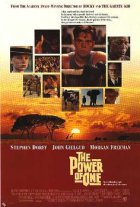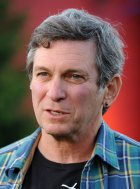
The Power of One Page #6
- PG-13
- Year:
- 1992
- 127 min
- 1,893 Views
(beat)
... with all due respect.
29.
Marais fixes PK with a stare. PK's eyes meet his evenly,
unwavering. Maria enters.
MARIA:
Papa, would you like coffee in the
library or the parlor?
MARAIS:
(pleasant)
The library, mein leib.
Maria smiles at PK and exits. He leads PK towards the
library.
MARAIS:
I can't figure out if you're
brave or foolish.
PK:
Why is that, sir?
MARAIS:
You come here to ask for permission
to see my daughter. Correct?
PK:
Yes, sir.
MARAIS:
And knowing who I am, what I stand
for, do you think this sort of
discussion is going to put that
request in a favorable light?
PK:
I thought a man of your intellectual
reputation wouldn't want his
daughter seeing someone who didn't
think.
MARAIS:
Let me give you some advice then.
You're right. I admire a keen
mind. But intellectual reputation
or not, I am first a Marais, a
member of the Volk.
MARAIS (CONT'D)
And if you're trying to impress a
member of the Volk with your
intellect, don't do it espousing
liberal ideas picked up in an
English private school.
30.
PK:
These ideas I picked up somewhere
else.
Marais opens the library door.
MARAIS:
(joking)
No doubt from an expert on race
relations.
PK:
Actually, sir, from an expert on
cactus.
CUT TO:
40 EXT. ROCK OUTCROPPING - DAY 40
A brilliant African sun beats down on the veldt below.
On the rock, a seven-year-old PK sits looking somewhat
sadly over the landscape. A long shadow covers him.
The CLICK of a CAMERA is heard. PK turns, shielding his
eyes with his hand against the glare of the sun to a
tall, white-haired figure, shirtless, in hiking boots
and kneesocks, holding a box camera.
DOC (FIGURE)
Ja. Perfect. You will excuse me,
please.
DOC, speaking in German-accented English, moves off from
the sun's glare down to PK's level. On his back is a
knapsack with a cactus sticking out of it.
DOC:
This I do not normally without
permission do, ja? But to catch
the expression. After all, it is
the expression that is important.
Ja? Without the expression the
human being is just a lump of meat.
You have some problems, I think.
I am Professor Karl von Vollensteen.
Doc clicks his heels together and bows his head slightly.
PK:
I'm P.K.
He holds out his hand. Doc takes it.
DOC:
Such a young person with such an
31.
old expression. I think we can
be friends. Ja?
Eighteen-year-old PK narrates.
PK (V.O.)
That was how I met Doc, as he
insisted I call him. A chance
meeting between a directionless
seven-year-old boy and an old
German professor out collecting
cacti on the African bush veldt.
(pause)
So began my education.
Doc and PK walk the veldt across craggy mountain trails,
down dry river beds, through the jungle, always collecting
cacti and aloe samples, Doc always talking, always
explaining.
PK (V.O.)
Doc believed the brain had two
functions and that the South
unfortunately dealt with only one.
DOC:
The brain, P.K., has two functions.
It is the best reference library
ever, which is a good thing to
have. Ja? But also from it comes
original thought. In school you
will get all filled up with the
facts. Here your brain will learn
where to look, how to look, how
to think. And then you will have
for yourself all the brains that
have ever been.
Doc and PK sit high up. PK watches the endless animal
migration below while Doc points things out across the
landscape.
PK (V.O.)
Doc knew everything. He had a love
of learning. But his real passion
was centered around two things -
music and cacti.
CUT TO:
41 EXT. DOC'S HOUSE 41
PK and Doc walk up a steep road toward Doc's house which
sits on top of the hill, both carrying cacti-filled
32.
packs.
PK (V.O.)
Until he was fifty, Doc had asuccessful career as a concert
pianist all over Europe. On his
fiftieth birthday he gave it allup and moved to South Africa.
From that point on it was all
cactus.
CUT TO:
42 EXT. CACTUS GARDEN - DAY 42
Behind Doc's simple, whitewashed cottage is a magnificent
cactus and aloe garden filled with the samples Dochas collected for years. PK and Doc plant anotherspecimen. Doc photographs it. PK records its genusin a notebook.
PK (V.O.)
Every specimen Doc found would becarefully photographed andcatalogued.
CUT TO:
43 SUNSET 43
Doc an PK walk through the cactus garden.
DOC:
If God would choose a plant torepresent Him, I think He wouldchoose of all plants the cactus.
This one plant has all theblessings He tried but failed togive man. It is true. Look.
submissive. It grows where noother plant will grow. The sun
bakes its back, the wind rips itfrom cliffs, or drowns it in the
dry desert sand. Not a complaint.
In good times or bad it willstill flower. It protects itselffrom danger.
DOC:
But it harms no other plant. It
33.
modesty. In Mexico there is a
cactus that blooms once in a
hundred years and then only at
night. That is saintliness of
the highest order I think. Ja?
heal the wounds of men and little
buttons if you eat one you can
touch the face of God or stare
into the mouth of hell. It is
the plant of patience, solitude,
love, and madness. Modesty,
beauty. Toughness and gentleness.
Of all the plants I think it is
closest to God. Ja?
PK (V.O.)
Doc was a hard man to disagree
with. So when he decided I must
spend as much time with him to
remedy the flaw in my educational
environment I didn't argue.
CUT TO:
44 INT. GRANDFATHER'S PARLOR 44
Shabbily-genteel, Doc sits in his Sunday best, a cup of
tea on his lips, talking in earnest to PK's pipe-
puffing, also shabbily-genteel grandfather as PK looks on.
PK (V.O.)
Appealing to my grandfather's
stoic belief in the primacy of
European culture in all its forms,
piano in return for my helping
him locate and gather his precious
cacti.
CUT TO:
45 INT. DOC'S COTTAGE 45
Doc and PK practice on a beautiful Steinway, so grandly
out of place in Doc's simple abode.
PK (V.O.)
As a student of music I was never
more than adequate, something I
suspect Doc knew from the start.
It is the love of music that is
most important, he would tell me,
34.
CUT TO:
46 EXT. JUNGLE 46
Doc and PK wander through the jungle looking for flora.
DOC:
Everything fits, P.K. Nothing isunexplained. Nature is one bigchain reaction. Everythingdepends on everything else. From
the smallest to the biggest.
Always in life an idea startssmall like a tree.
Doc shows PK a small tree with an even smaller vine
attached to it.
DOC:
This tree can grow so high it cantouch the face of the sky. But
this little vine can choke it and
keep it small. Most people arelike these vines. Afraid of new
ideas. Afraid to let things grow.
Doc rips the vine away from the tree.
DOC:
Always listen to yourself.
Follow your own idea. If you arewrong, so what? You learn
something. And with learning you
grow stronger. And if you areright at the beginning? An even
bigger bonus.
CUT TO:
Doc and PK move alongside the great herds.
PK (V.O.)
I roamed the kloofs and ridges,
the dry riverbeds and junglefloors with Doc for over a year,
learning more than I realize eventoday.
(pause)
I also played a lot more 'GodSave the King' due to my newmusical celebrity.
Translation
Translate and read this script in other languages:
Select another language:
- - Select -
- 简体中文 (Chinese - Simplified)
- 繁體中文 (Chinese - Traditional)
- Español (Spanish)
- Esperanto (Esperanto)
- 日本語 (Japanese)
- Português (Portuguese)
- Deutsch (German)
- العربية (Arabic)
- Français (French)
- Русский (Russian)
- ಕನ್ನಡ (Kannada)
- 한국어 (Korean)
- עברית (Hebrew)
- Gaeilge (Irish)
- Українська (Ukrainian)
- اردو (Urdu)
- Magyar (Hungarian)
- मानक हिन्दी (Hindi)
- Indonesia (Indonesian)
- Italiano (Italian)
- தமிழ் (Tamil)
- Türkçe (Turkish)
- తెలుగు (Telugu)
- ภาษาไทย (Thai)
- Tiếng Việt (Vietnamese)
- Čeština (Czech)
- Polski (Polish)
- Bahasa Indonesia (Indonesian)
- Românește (Romanian)
- Nederlands (Dutch)
- Ελληνικά (Greek)
- Latinum (Latin)
- Svenska (Swedish)
- Dansk (Danish)
- Suomi (Finnish)
- فارسی (Persian)
- ייִדיש (Yiddish)
- հայերեն (Armenian)
- Norsk (Norwegian)
- English (English)
Citation
Use the citation below to add this screenplay to your bibliography:
Style:MLAChicagoAPA
"The Power of One" Scripts.com. STANDS4 LLC, 2024. Web. 24 Dec. 2024. <https://www.scripts.com/script/the_power_of_one_143>.



Discuss this script with the community:
Report Comment
We're doing our best to make sure our content is useful, accurate and safe.
If by any chance you spot an inappropriate comment while navigating through our website please use this form to let us know, and we'll take care of it shortly.
Attachment
You need to be logged in to favorite.
Log In